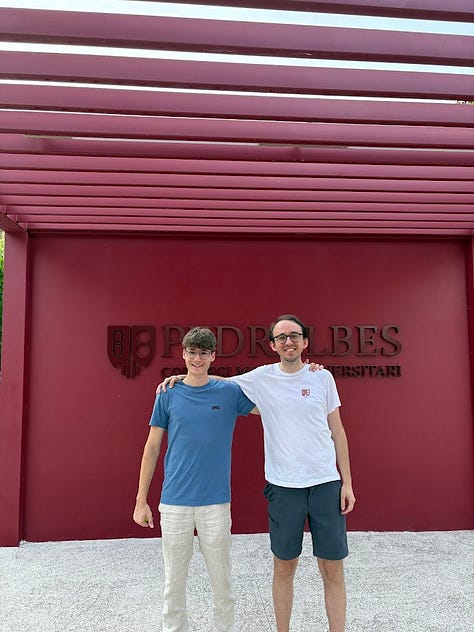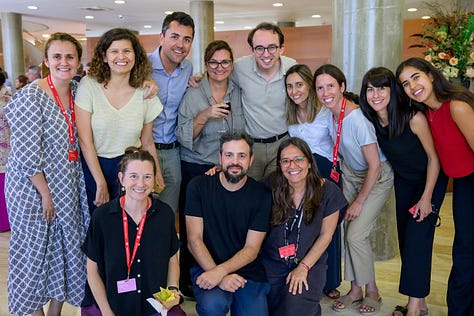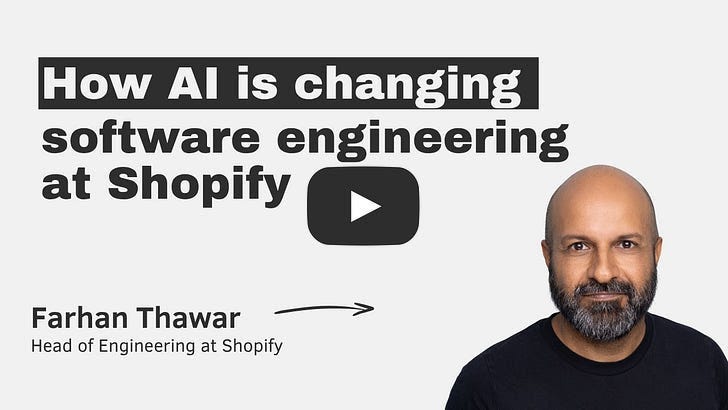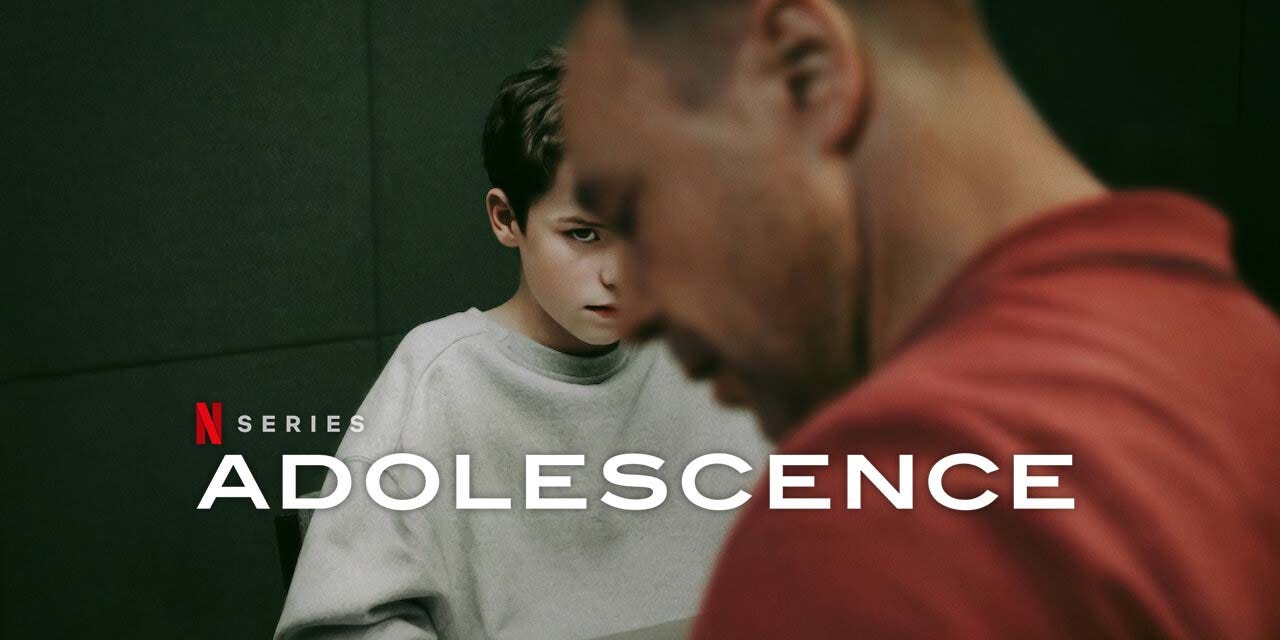#4 — GenAI is here to stay in CSE
So let's embrace it while thinking opps and challenges so that it remains relevant
I have a shorter-than-usual newsletter for you this week since I am taking a few weeks off before traveling to the US for my new PhD life. BUT! I just read a very cool paper this week that I summarize for you, along with a few other teaching resources, a good byte from the industry, community highlights, and a very interesting podcast episode to ponder.
My summary of the paper: Rethinking Computer Science Education in the Age of GenAI
This week I want to highlight this excellent opinion paper by Orit Hazzan and Yael Erez. I liked how it's organized—it's easy to read and got me thinking about opportunities and challenges from both student and instructor perspectives.
We're in a moment of intense reflection in Computer Science Education. The article's authors highlight two reasons for this disruption brought by Generative AI:
a) Generative AI tools excel at programming tasks, and b) Generative AI tools are extensively used in the software industry.
In terms of opportunities, several things excite me:
The emergence of new teaching/learning materials and new teaching methods in response to this new reality. For example: Generative AI can help CS educators generate examples and explanations for different student levels and learning outcomes, such as real-world metaphors or analogies to understand difficult topics.
The development of tools that facilitate learning (GenAI-powered assistants) in any area of computer science and help educators with things like managing students' cognitive load, while also assisting students 24/7 at no cost (or at a very affordable one).
The guidance work that professors will need to do so students know how to critically evaluate AI-generated responses. This is an opportunity to train another high-level skill as part of metacognitive abilities.
The internal motivation for computer science students to become more engaged and persist in their studies, as well as having GenAI support self-regulated learning skills.
I like seeing how students perceive the shift toward thinking about computer science and focusing less on programming. This leads to not only teaching low-level tasks (this fundamental knowledge remains essential) but dedicating more time and effort to high-level tasks that have more to do with analyzing and evaluating.
The assessment that Generative AI tools enable is completely different from what we were used to, generating examples and contexts while considering learning style. From the instructor's perspective, it can reduce academic dishonesty since it's not biased.
Testing and debugging are also opportunities that open up, always accompanied by prior explanation from the computer science educator about how to use these skills.
Prompt engineering is an expression of computational thinking, and using GenAI develops this competency. AI can amplify this by generating different scenarios.
AI's conversational style could improve students' metacognitive skills in problem-solving and could also enhance self-assessment and self-regulation in the learning process.
In terms of challenges, several things concern me that aren't new but require deep reflection:
Excessive dependence on GenAI assistance (external validation) while setting aside fundamental understanding and metacognitive skill development.
At the motivational level, there could also be a contrary effect where students become demotivated due to lack of skills to understand GenAI responses.
Curriculum developers should redefine what constitutes "creating" when GenAI generates solutions and code.
Tasks, assessments, and explanations produced by AI should be accurate, comprehensive, and clear. Accuracy and relevance must be supervised by computer science educators to ensure the quality of generated content.
Perpetuating or amplifying biases and maintaining human connection.
Full paper here.
One good bite from the industry
→ How AI is changing software engineering at Shopify with Farhan Thawar
Shopify's Head of Engineering, Farhan Thawar, shares how the company is using internal LLMs, unlimited AI tokens, and custom tooling to figure out how to use AI tools more efficiently.
You can watch it here.
CS Teaching Resources
→ Introduction to Computer Science (python-version)
If you teach intro to CS and the programming language you've chosen is Python, this recent course by Iris Howley from Williams College includes labs, lectures, and activities that you can draw ideas from to adapt for your own materials.
→ Online CUDA Playground
CUDA (Compute Unified Device Architecture) is a parallel computing architecture developed by NVIDIA that includes a compiler and a set of development tools. LeetGPU is a CUDA environment for learning to write and execute a variation of the C programming language to code algorithms on NVIDIA GPUs. It has an editor that allows you to run code on a variety of NVIDIA drivers, and there's a challenges section with problems like matrix multiplication, agent simulation, multi-head attention, and more.
→ A web-based ASCII diagram builder
A free ASCII diagram creator written in Vanilla JS. Here it is.
→ The Nature of Code
In this book the author Daniel Shiffman uses the Processing language to help us understand the various behaviors of natural systems in our world by creating diverse simulations.
You can take a look here.
🌎 Computing Education Community Highlights
Ali Shokri, a new assistant professor in my department at the University of Houston, is actively hiring PhD students for Fall 2025 in the areas of Automated Software Productivity (code synthesis and translation) and Code Reliability and Quality (bug detection and security assurance). If you're interested in these topics, please refer to this page.
This is a huge milestone for the Experience CS team as they launched the first 6 units of their cross-curricular Scratch resource for 3rd to 8th grade students. This project has been a huge labor of love as they work to create a resource that supports educators in bringing computer science to their classrooms. Check out what they have been working on today at experience-cs.org!
🤔 Thought(s) For You to Ponder…
The tools have changed, but the joy hasn't. It's still this great, fun, iterative process. And honestly, that's amazing. - Adam Gordon Bell
Today I want to bring to this more contemplative and reflective section this new episode of coRecursive that revisits the idea of finding meaning in creating things. With AI coding agents, for many people the development workflow has changed, and it's easy to feel that something essential about our work as technologists is being lost. But this episode made it clear to me that the creative part cannot be replaced by any tool. If your identity is tied to creating things, changing tools shouldn't be a problem—on the contrary, if you focus on learning and see them as a brilliant partner that can help you be better, the iterative process can be incredibly fun while also allowing you to achieve great results.
The PhD Student Is In
A summer programming note
Thank you to everyone who listened to the first three episodes of my new podcast! I'll be back in September with new episodes for you. Please have a nice summer, and find some sand for your toes if you can.
BTW, the latest episode with Ibrahim Albluwi has been, by far, the most watched, listened to, and commented on. Just on my YouTube channel alone, it's accumulated almost 100 views. If you want to keep watching the episodes, subscribe to the channel here so you don't miss anything.
🪁 Leisure Line
Last weekend I was in Campo de Criptana (Ciudad Real) and the long drive was well worth it because we were invited to a real Valencian paella at some friends' house. Despite the heat (over 100 degrees), the rice and good company made it a great day out.



July 22 will be my last day in Barcelona, an incredible city where I have lived for six years, where I have met so many people and where I have been very happy. So many lessons learned, so much gratitude, so much love... But well, this stage is over. To love is also to know how to leave, with a heart full of names.
Currently Reading, Watching, Listening 📺
I had "Adolescence" on my to-watch list. I'll confess: I've only watched the first episode—it ends too intensely for me, I'm one of those people who can't handle this type of story—but from what I've seen, it struck me as technically very well-executed with the long takes and the performances. And beyond technical merits, I find the direction it's taking interesting in how it addresses issues of digital life, online habits, teenagers vs. adults...
That's all for this week. Thank you for your time. I value your feedback, as well as your suggestions for future editions. I look forward to hearing from you in the comments.










